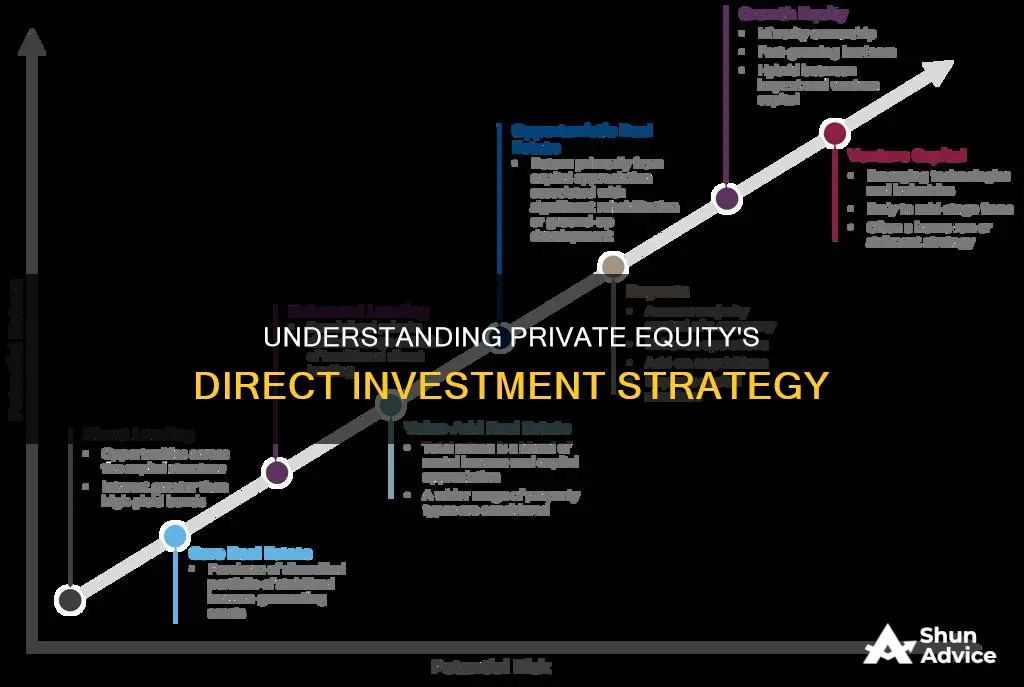
Direct investment is a term used to refer to foreign direct investment (FDI), which involves investing in a foreign business enterprise to acquire a controlling interest in that enterprise. This type of investment provides capital funding in exchange for an equity interest without purchasing regular shares of a company's stock. Direct investment can take various forms, including vertical, horizontal, or conglomerate investment. It is often contrasted with fund investing, where investors contribute to a fund that then invests in a portfolio of operating companies. Direct private investments (DPI) are a specific type of direct investment where individuals directly invest in the privately issued equity or debt of a specific business, bypassing the use of funds or intermediaries.
Characteristics of Direct Investment in Private Equity
| Characteristics | Values |
|---|---|
| Definition | Direct investment in private equity refers to investing directly in a private company, without using a fund managed by an external asset manager or general partner. |
| Type of Investment | Direct equity investment involves the acquisition of ownership in a company's shares or stocks by an investor. |
| Control and Decision-Making | Direct equity investors have control over which companies they invest in and may have a say in the company's decision-making process through voting rights and attendance at annual general meetings. |
| Portfolio Customisation | Direct equity investments allow investors to build a diversified portfolio tailored to their preferences and investment goals. |
| Due Diligence | Direct equity investments require a higher level of due diligence as investors are responsible for evaluating potential investments and making individual stock selections. |
| Risk Profile | Direct equity investments offer the potential for higher returns but also carry greater risks, including market volatility, company-specific risks, and liquidity risk. |
| Investor Profile | Direct equity investments are suitable for investors with a higher risk appetite, a long-term investment horizon, and a willingness to actively monitor and manage their investments. |
| Investment Process | Direct equity investors conduct fundamental analysis, evaluating macroeconomic factors, industry trends, and company-specific details to identify undervalued companies with strong growth potential. |
| Investment Goals | Direct equity investments align with investment goals such as capital appreciation, dividend income, or a combination of both. |
| Investor Involvement | Direct equity investors are actively involved in the investment process, requiring a significant commitment of time, knowledge, and effort. |
| Fees and Expenses | Direct equity investments may involve lower fees compared to other investment approaches, such as fund of funds, as there is no additional layer of management fees. |
What You'll Learn

Foreign direct investment (FDI)
FDI creates stable and long-lasting links between economies and is a key element in international economic integration. It is an important channel for the transfer of technology and promotes international trade by providing access to foreign markets. FDI can also be a significant vehicle for economic development, particularly in emerging nations. For example, developing countries have encouraged FDI as a means of financing new infrastructure and creating jobs.
The top recipients of FDI in recent years have been the United States and China, with the US being the top destination for FDI globally for twelve consecutive years. In 2022, foreign firms invested a total of $177 billion in the US. However, the US share of global FDI has declined over the years, dropping from nearly 40% in 1999 to 24% in 2016.
FDI is generally categorized as horizontal, vertical, or conglomerate. Horizontal FDI involves a company establishing the same type of business operation in a foreign country as it operates in its home country. Vertical FDI involves acquiring a complementary business in another country, such as a supplier of raw materials. Conglomerate FDI occurs when a company invests in a foreign business unrelated to its core business, often in the form of a joint venture.
Managing Multi-State Investments: A Comprehensive Guide
You may want to see also

Direct Private Investments (DPI)
There are two primary forms of DPI: equity and debt securities. Equity DPI involves purchasing stock in a company, representing an ownership interest in that company. Debt DPI, on the other hand, involves lending money to a company, often in the form of a promissory note or senior note.
DPI is typically sold privately by the issuer directly to investors, with the assistance of a broker-dealer. These investments are made under a private placement exemption from registration with the Securities Exchange Commission. DPI provides investors with access to small and medium-sized businesses (SMBs), which represent a significant portion of the US economy.
One key advantage of DPI is the potential for greater investment returns due to the risk involved. Additionally, DPI offers more meaningful investments, allowing investors to decide where their capital goes and select companies that align with their values. DPI also provides "absolute returns" that are less correlated with the public markets, meaning the investment performance is largely determined by the financial performance of the issuing business.
It's important to note that DPI carries additional risks, particularly illiquidity, as these investments don't have an active secondary market. As such, DPI is usually held until the underlying business is sold or recapitalized.
Investment Management: Choosing the Right College Major
You may want to see also

Co-investing
Co-investors are typically charged a reduced fee for the investment and receive ownership privileges equal to the percentage of their investment. The majority of the money invested usually comes from a private equity or VC firm.
Co-investments are attractive to private equity funds and investors for several reasons. For example, they can be a means for private equity funds to gain access to supplementary capital and make larger single investments. For investors, co-investments can provide enhanced diversification and a larger share of desirable investments.
Co-investments also offer exposure to new markets and alternative investment options, such as mid-market companies or planning-based investment deals. They can also provide more capital and greater flexibility for private equity or VC firms, allowing them to free up their own capital for other purposes.
However, co-investments can be complex and risky ventures, requiring a great deal of transparency and disclosure. Co-investors should be well-informed about how the fund is run and executed, and research the fund's management team. There may also be a lack of fee transparency, with potential hidden costs involved.
Overall, co-investing can provide investors with access to new markets and the potential for higher returns, but it is important to carefully consider the risks and complexities involved.
ERP Modules: Unlocking Investment Management Potential
You may want to see also

Horizontal direct investment
For example, a fast-food franchise based in the United States might open restaurants in China. This is an example of horizontal direct investment because the company is replicating its existing business model in a new market.
Investment Networks: Financial Risk Management Strategies
You may want to see also

Conglomerate-type direct investment
Direct investment provides capital funding in exchange for an equity interest without purchasing regular shares of a company's stock. It may involve a company opening its own business operations in another country or acquiring control of a foreign country's existing business assets.
Direct investment is distinct from portfolio investment, which involves purchasing common or preferred stock shares of a foreign company. The key difference is the element of control sought by the investor. This control can be gained through sources other than capital investment, such as acquiring control of assets like technology.
Direct investment can be made by individuals but is more commonly made by companies aiming to establish a business presence in a foreign country.
Understanding Portfolio Risk: Variance in Investments
You may want to see also
Frequently asked questions
Direct investment in private equity is the most direct path to owning private equity assets. It involves the purchasing of ownership in an operating company by an investor. This can be done through a holding entity, such as an LLC, which purchases the shares in the operating company. The amount of ownership can vary, and it may involve a controlling interest or a minority growth investment.
Co-investing is a subset of direct investing, where an investor invests alongside a lead sponsor to purchase ownership directly in an operating company. In direct investing, the investor makes the decisions and has control over the investment, whereas in co-investing, the investor follows the lead of another investor or group.
Direct investment in private equity offers several benefits, including greater potential returns, more meaningful investments, and lower correlation to the public markets. It also allows investors to have a more direct relationship with the companies they invest in and make decisions that align with their values and interests.







